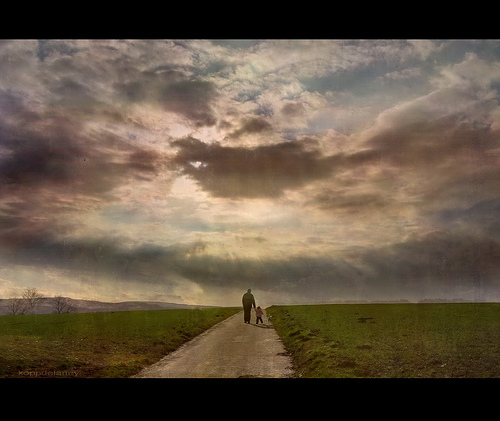We run our website the way we wished the whole internet worked: we provide high quality original content with no ads. We are funded solely by your direct support. Please consider supporting this project.

To What Extent is the Future Open to Real Possibilities?
We frequently get questions about the extent to which the future is composed of actual possibilities rather than settled or determined. Here’s what Greg has to say in response to these questions:
1. We can be confident the future is settled, to the extent that the Bible depicts the future as settled. This, of course, assumes you’re confident that a)—the Bible is divinely inspired and b)—that your interpretation of the Bible is accurate. Also, to the extent that we can be confident God isn’t going to fundamentally alter the laws of physics, we can assume that all aspects of the future directly entailed by these laws are closed. In other words, to the extent that science can accurately predict the future, the future is closed.
Conversely, to the extent that the Bible depicts the future as open (which it does all over the place!), we can be confident the future is open. This again assumes you’re confident that a)— the Bible is divinely inspired and b)—that your interpretation of this aspect of the Bible is accurate. Also, to the extent that we deliberate about decisions, weighing the different possibilities before us, we may assume the future is genuinely open. Indeed, we need to presuppose it’s open in order to deliberate about it (which is why I argue that everybody presupposes [and thus unconsciously believes] the open view of the future is true, despite the fact that they may sincerely think it’s false!)
Beyond this, I honestly don’t think we can know much. In fact, though we have to presuppose the future is open whenever we deliberate about various courses of actions we might take, we really can’t know the extent to which our own future is truly open. We don’t know the extent to which our thoughts and actions at any given moment are genetically and environmentally determined. And if we can’t even know this about ourselves, how much less can we know this about anyone else?
2. Our inability to confidently determine much about the future in terms of what is and is not open doesn’t mean the concept of an open future is empty, any more than it implies that the concept of a partly closed future is empty. In fact, if you think about it, this way of reasoning would eventually lead to the conclusion that all concepts about which one isn’t omniscient are meaningless – which of course is absurd.
3. While we can’t ordinarily know in any concrete way the extent to which our future (or anyone’s future) is open, this doesn’t negate the important principle that the future is open to the extent that a person is morally responsible for the way they resolve possibilities. In other words, we are morally responsible for our actions insofar as we could have done otherwise.
Now, it may be the case that at the time a person performed an action they couldn’t have done otherwise due to the way their character had been solidified. Yet, as Aristotle understood so clearly 2400 years ago (as described in Nicomedian Ethics), this person may still be responsible for their action if they themselves were responsible for developing their character the way they did. In other words, the fact that a person can’t now do otherwise regarding a particular course of action doesn’t excuse them if they once could have done otherwise. The guy who now can’t help but to spend his kid’s milk money to get high on meth is still responsible for his actions, because he made the morally responsible choice to go down a path that led him to this pathetic bondage.
4. As a principle, we can know that a person is morally responsible for that about which they could have done otherwise. But if we remember that we can’t even know the extent to which our own future is open, this means we can’t know the extent to which any person is actually morally responsible for what they do. But why should this bother us? We’re not to judge anyone – precisely because God alone knows the extent to which they are responsible for what they do. Paul said he didn’t even judge himself, and I’m convinced this is why (I Cor. 4.3).
Now, of course society needs to judge people for legal purposes, and so it is a jury’s duty to decide the extent to which a person could have avoided doing what they did. But as believers, we’re to know that we can never judge.
I find it helpful to walk with the following mindset. While I don’t judge myself, I assume that my future is maximally open while assuming that other people’s futures are maximally closed. That is, if I am deliberating about several options, I assume that these options are genuinely possible and that my future, at least in regards to these decisions, is open. But with regard to other people’s actions, I assume that, however things appear, they couldn’t have done otherwise (unless, of course, I’m serving on a jury where I have to guess differently).
Here’s my rational for this assumption: with regards to my own actions, I have to act on the assumption that I’m free to make genuine decisions. As I said earlier, there’s no other way to deliberate except by presupposing your decision is genuinely open and up to you to resolve. And in regards to other people’s actions, I’m forbidden to judge them anyways, so what good does it do to assume they’re responsible? I find that living in this reality empowers me to take total responsibility for my life, on the one hand, while freeing me from my fallen addiction to judgment, on the other.
Let us take responsibility for our lives, relinquish responsibility for judging others, and humbly acknowledge our massive ignorance at all times.
Image by h.koppdelaney via Flickr
Category: Q&A
Tags: Choice, Free Will, Future, Judgment, Open Theism
Topics: Free Will and the Future
Related Reading

What is the significance of Numbers 11:1–2?
The Lord was in the process of judging Israel by fire when Moses interceded in prayer “and the fire abated.” A common sense reading of the verse suggests that the fire would have continued had Moses not prayed. Scripture is full of examples of God changing his plans in response to human prayer and repentance.…

How do you respond to Genesis 15:13–15?
The Lord tells Abraham that his offspring “shall be aliens in a land that is not theirs, and shall be slaves here, and they shall be oppressed for four hundred years; but I will bring judgment on the nation that they serve, and afterward they shall come out with great possessions.” This passage may constitute…

Podcast: Where Does Omniscience Fit In Within Open Theism?
Greg pontificates on what God knows. http://traffic.libsyn.com/askgregboyd/Episode_0280.mp3

What is the “classical view of God” and what about it do you find objectionable?
The “classical view of God” refers to the view of God that has dominated Christian theology since the earliest Church fathers. According to this theology, God is completely “immutable.” This means that God’s being and experience never change in any respect. God is therefore pure actuality (actus purus), having no potentiality whatsoever, for potentiality is…

What is the significance of 2 Chronicles 12:5–8?
The Lord allows King Shishak of Egypt to almost conquer all of Israel because of King Reheboam’s rebellion. “You abandoned me, so I have abandoned you to the hand of Shishak” (vs. 5). The officers and king repent, so the Lord responds by saying, “They have humbled themselves; I will not destroy them, but I…

How do you respond to John 21:18–19?
Jesus says to Peter, “‘[W]hen you were younger, you used to fasten your own belt and to go wherever you wished. But when you grow old, you will stretch out your hands, and someone else will fasten a belt around you and take you where you do not wish to go.’ (He said this to…
